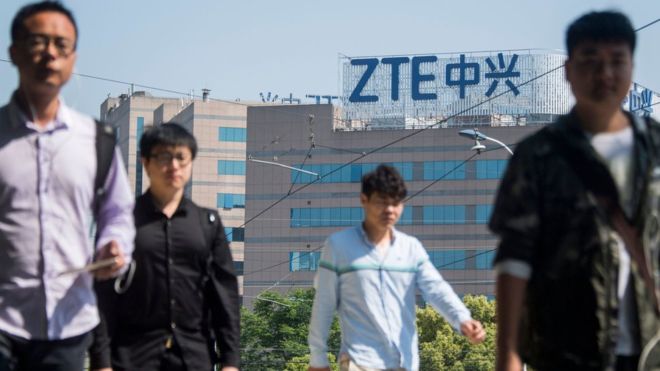China has welcomed a pledge from Donald Trump to help save ZTE, one of China’s biggest telecoms companies.
The firm has suspended operations after the US last month banned American companies from selling it components. ZTE had admitted to making illegal shipments to Iran and North Korea.
But Mr Trump has now tweeted he will work with President Xi to help ZTE get “back into business fast”, saying too many jobs in China were at risk.
China’s called the comments “positive”.
“We greatly appreciate the positive position of the US on the ZTE issue and are in close communication with the US on the details of the issue,” foreign ministry spokesman Lu Kang said.
US commentators say the tone of the tweet is a dramatic shift for Mr Trump, who has consistently accused China of stealing US jobs.
The concession to Beijing comes ahead of high-level trade talks later this week in Washington aimed at resolving an escalating trade dispute between the world’s two largest economies.
Beijing has made resolving the situation with ZTE, which employs about 80,000 people, one of its demands for striking a broader trade agreement with with US.
In March 2017, ZTE admitted to violating US sanctions by illegally shipping American technology to Iran and North Korea and was fined $1.1bn (£800m).
The current export ban – which lasts seven years – was imposed last month after the company allegedly failed to comply with its agreement.
It was accused of lying about the punishment of employees involved in skirting the sanctions.
US companies provide at least a quarter of the components used in ZTE’s equipment, which includes smartphones and telecommunications network equipment.
ZTE spent more than $2.3bn on imports from about 200 US companies last year.
Douglas Jacobson, a lawyer in Washington DC who represents some of ZTE’s suppliers, said: “This is a fascinating development in a highly unusual case that has gone from a sanctions and export control case to a geopolitical one.
“There’s no legal mechanism for this. How this will play out remains to be seen. They are not simply going to be able to resume business as usual.”
Source: BBC



